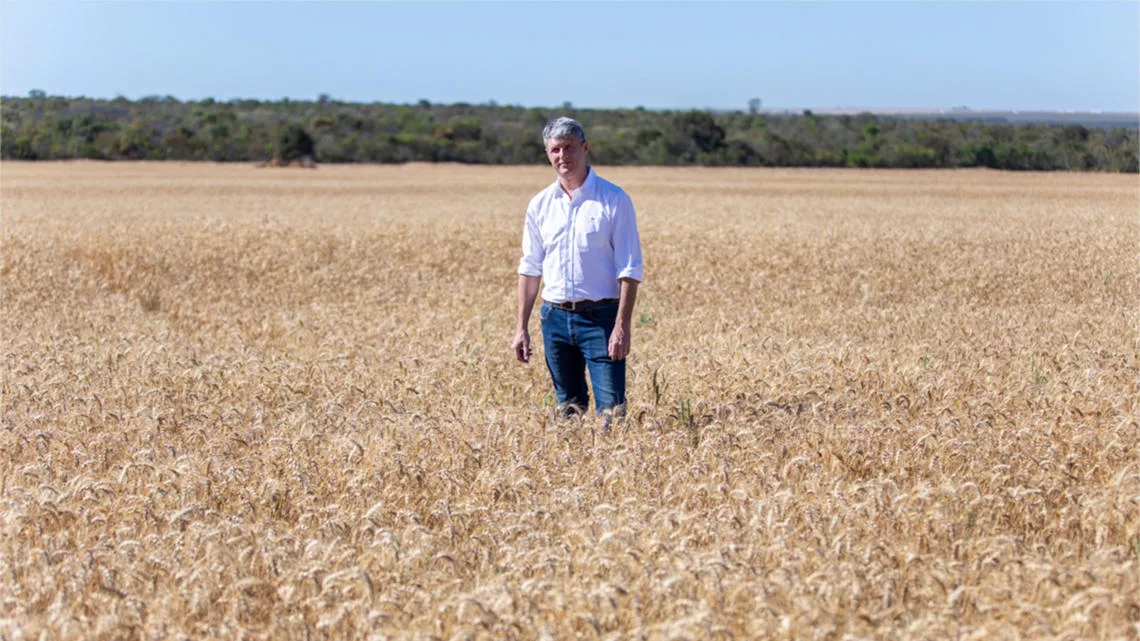Authors
The Soft Commodities Forum
Leia em português – Perspectivas do Produtor: Os desafios da agricultura sustentável no Cerrado do Oeste da Bahia
Jarbas Bergamaschi, aged 46, is a rural producer and owner of Sama Farm in the Brazilian Cerrado, where he cultivates soybeans, wheat, corn, and sorghum. Having lived in Western Bahia since 2001, the same year he graduated in business administration and left his hometown of Xanxerê in Santa Catarina, Jarbas moved to Sama Farm in 2007, located in the municipality of Luís Eduardo Magalhães, within the same region of the state. We recently spoke with him to better understand the importance of sustainable agriculture in Bahia, and his experience with implementing sustainable agricultural practices in the region.
Q: What does sustainable agriculture mean to you?
A: Sustainable agriculture is fundamental for sustaining our business. As producers, our goal is to preserve and keep the soil healthy because it represents our most valuable asset. The Forest Code mandates that in our region at least 20% of an agricultural property must be maintained with native vegetation. Our farm consists of 28% native vegetation, including a Permanent Preservation Area (APP) and a legal reserve along the banks of a river that traverses our property. To protect this legal reserve near the river, all our productive areas are located at the highest points of the property, maintaining a distance of approximately one thousand meters from the river. In this context, our irrigation system is equipped with water management, allowing us to use only the necessary amount of water. Thus, we utilize natural resources, including water and agricultural inputs, in a sustainable manner.
Q: What are the most important techniques in your daily farm operations, and the most important markets for your business?
A: We work with a no-till farming system for as long as possible, and when necessary, we renew the soil profile. We maintain contour lines in our areas due to the slope. We also employ a pest management system, whether they are chemical or biological, and we have advanced equipments, such as tractors, sprayers, and planters, for greater operational efficiency. We preserve the local roads within the farm with water containment measures to prevent erosion.
Our primary markets are domestic, particularly for wheat, sorghum, and corn, while the majority of our soybeans are directed toward export markers through regional trading companies.
Q: In your experience, is it challenging to produce sustainably, without clearing land?
A: I don’t see this as a problem here. Our environmental legislation is quite stringent, so farmers only clear land within the legal boundaries of their property, protecting legal reserves. Clearing land illegally is no longer a practice among soy producers in this region; it is something that no longer fits within the activities of the producers. In fact, farmers are focused on preserving their reserves and protecting the soil. There’s even a community along our road, and when there’s a fire, we gather everyone and go fight the blaze. Rural producers want to preserve in every way possible.
Q: Global markets, such as the European Union, are imposing restrictions on products linked to deforestation. How will these measures affect your business?
A: I don’t see a problem with the European market because in Brazil we have a very stringent law which guides us to preserve while producing. This should suffice. Brazil is one of the countries that conserves the most native vegetation worldwide, and rural producers are aware of this. Producers understand the need to comply with regulations and take care of preservation areas. We keep our preservation area, pay taxes on this land, and have the obligation to look after it. This cost remains with us, as we don’t receive any financial benefit from such practices. It’s the law, and we comply with it. We see this as a way to leave a better place for our children and grandchildren, and we take pride in conserving and protecting our land. We are also able to comply with international certifications in labor and environmental issues.
Q: What incentives are necessary, in your view, to promote sustainable agriculture?
A: The greatest incentive is our own desire to pursue technological advancements, cater to the market, and ensure that our products are recognized and valued. The products here in Bahia have a quality advantage due to the soil and solar exposure. An incentive would be for the market to reward our product based on its protein content, in the case of soybeans and corn, and in the case of wheat, we produce an improved, exceptionally high-quality crop. We are fulfilling our responsibilities, and traders have access to our documentation and understand how we operate. The missing piece is for the market to recognize the economic value of our product.
Q: From a sustainability perspective, how do you envision your farm and the region evolving in the long-term future?
A: I see this region becoming increasingly sustainable, as people become more conscious and recognize the benefits of soil preservation and proper land and crop management. We need to improve infrastructure in our region, especially in terms of logistics and grain storage. By maintaining legal reserves and their fauna, we will always have a balance between the productive sector and environmental preservation, and it’s a trend that is already yielding positive results for everyone. Beyond their role as food producers, Brazilian farmers are also contributing to the preservation of the environment.
Disclaimer: The views and opinions expressed in this article are those of the interviewee.
WBCSD news articles and insights may be republished in accordance with the Creative Commons Attribution-NonCommercial-NoDerivatives 4.0 International Public License, and in accordance with our Privacy Policy. All Content must be featured with due credits.
Outline

